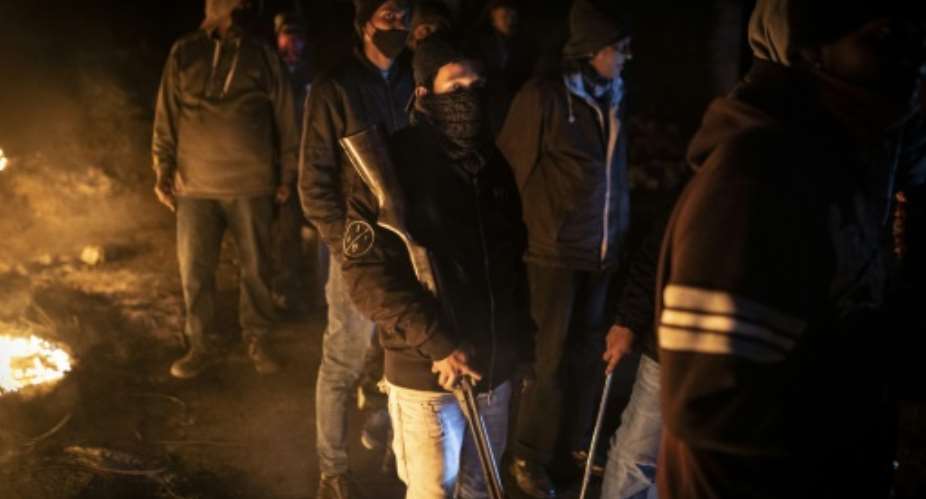South Africa's Human Rights Commission opened hearings Monday into July riots that left 354 dead, with witnesses giving vivid accounts of how the violence spilled into homes and devastated families.
The unrest that gripped the country in early July was the deadliest since the fall of the white-minority government.
Yet many people appear to have moved on in a country that has grown accustomed to a high crime rate with its accompanying sporadic outbreaks of violence.
Monday's hearing though was a grim reminder of how harrowing the riots were.
Witnesses described how teargas was fired into homes and loved ones were shot by vigilantes who themselves were often driven to violence by sheer terror at the lacklustre police response.
The hearings took place outside of Durban, an important port city in KwaZulu-Natal, that suffered the brunt of the violence.
But the only live coverage was carried by the commission itself on social media, with a feed that frequently cut out.
The riots began when former president Jacob Zuma, whose base of support is in KwaZulu-Natal, was sent to prison for refusing to testify in corruption proceedings against him.
Those initial protests degenerated into looting that spread to Johannesburg, in a show of discontent with South Africa's gaping divide between rich and poor.
The slow response by police prompted some residents to resort to vigilantism before President Cyril Ramaphosa deployed the military.
The first witness, Zama Nguse, said that was how her 17-year-old nephew Sibahle was killed.
She said businesspeople in Durban, angry at the looting of their shops, set fire to shacks and shot at people in her community -- including her nephew.
'Gasping for air'
"People were trying to get to a place of safety because teargas fired by private security had been thrown into their homes," she told the commission.
"Sibahle wasn't aware in (what) direction we ran and was looking for us. A man later told me Sibahle had been shot," she said.
"When I got up to the area where he was last seen, I found his siblings holding him. I had never seen a person dying before — when I saw him, it looked like he was gasping for air."
She also said she saw a woman being killed while holding a two-month-old infant.
The hearings are expected to run through December 3.
Police, military and state security officials are among those expected to testify.
The aim is to determine the causes of the unrest, lapses by police, the role of private security companies, and alleged racial motivations to some of the killings.
"The unrest was characterised by the loss of life, the targeting of retail centres, malls, shops and other businesses, schools as well as transport systems," the commission said in a statement.
"The unrest accordingly exacerbated, amongst other things, inequality between certain communities, unemployment levels, poverty, hunger and food insecurity."
The commission has powers to investigate rights violations, and to recommend appropriate redress.
It said damage from the riots totalled at least 25 billion rand (1.6 billion dollars, 1.4 billion euros).
Ramaphosa called the violence an attempted insurrection.





 Akufo-Addo commissions Phase II of Kaleo solar power plant
Akufo-Addo commissions Phase II of Kaleo solar power plant
 NDC panics over Bawumia’s visit to Pope Francis
NDC panics over Bawumia’s visit to Pope Francis
 EC blasts Mahama over “false” claims on recruitment of Returning Officers
EC blasts Mahama over “false” claims on recruitment of Returning Officers
 Lands Minister gives ultimatum to Future Global Resources to revamp Prestea/Bogo...
Lands Minister gives ultimatum to Future Global Resources to revamp Prestea/Bogo...
 Wa Naa appeals to Akufo-Addo to audit state lands in Wa
Wa Naa appeals to Akufo-Addo to audit state lands in Wa
 Prof Opoku-Agyemang misunderstood Bawumia’s ‘driver mate’ analogy – Miracles Abo...
Prof Opoku-Agyemang misunderstood Bawumia’s ‘driver mate’ analogy – Miracles Abo...
 EU confident Ghana will not sign Anti-LGBTQI Bill
EU confident Ghana will not sign Anti-LGBTQI Bill
 Suspend implementation of Planting for Food and Jobs for 2024 - Stakeholders
Suspend implementation of Planting for Food and Jobs for 2024 - Stakeholders
 Tema West Municipal Assembly gets Ghana's First Female Aircraft Marshaller as ne...
Tema West Municipal Assembly gets Ghana's First Female Aircraft Marshaller as ne...
 Dumsor is affecting us double, release timetable – Disability Federation to ECG
Dumsor is affecting us double, release timetable – Disability Federation to ECG
